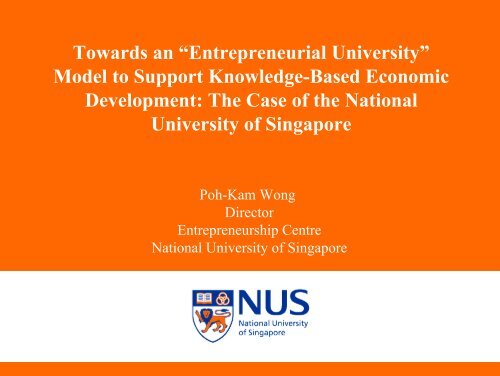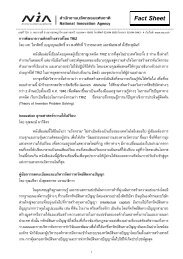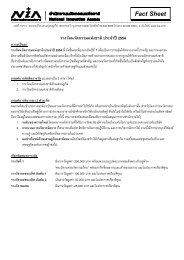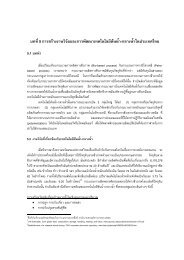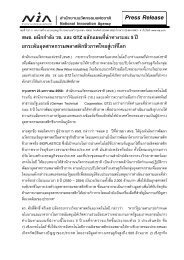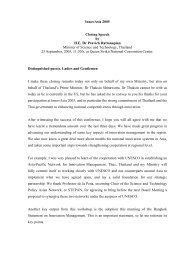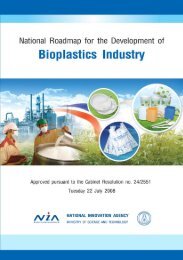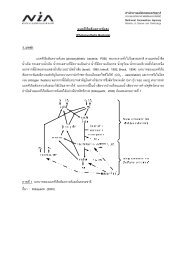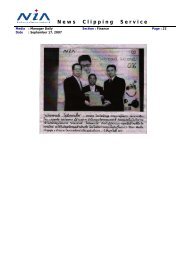Towards an entrepreneurial university model to support knowledge ...
Towards an entrepreneurial university model to support knowledge ...
Towards an entrepreneurial university model to support knowledge ...
You also want an ePaper? Increase the reach of your titles
YUMPU automatically turns print PDFs into web optimized ePapers that Google loves.
1<br />
NUS Entrepreneurship Centre<br />
<strong>Towards</strong> <strong>an</strong> “Entrepreneurial University”<br />
Model <strong>to</strong> Support Knowledge-Based Economic<br />
Development: The Case of the National<br />
University of Singapore<br />
Poh-Kam Wong<br />
Direc<strong>to</strong>r<br />
Entrepreneurship Centre<br />
National University of Singapore
2<br />
NUS Entrepreneurship Centre<br />
Outline of Presentation<br />
• Ch<strong>an</strong>ging Role of University in the tr<strong>an</strong>sition of NIE<br />
<strong>to</strong> Knowledge-Based Economy : The Need <strong>to</strong> Shift<br />
<strong>to</strong>wards <strong>an</strong> Entrepreneurial University Model<br />
• Singapore’s Experience: The Case of National<br />
University of Singapore<br />
• Implications & Possible Lessons for Other<br />
Countries
3<br />
NUS Entrepreneurship Centre<br />
Singapore’s Tr<strong>an</strong>sition <strong>to</strong>wards a<br />
Knowledge Economy<br />
Between 1960 <strong>an</strong>d 2004, Singapore achieved GDP growth rate of 8% p.a.,<br />
driven by the m<strong>an</strong>ufacturing sec<strong>to</strong>r <strong>an</strong>d sustained by development as<br />
major regional business <strong>an</strong>d tr<strong>an</strong>sportation hub<br />
Distinctly new phase of development emerging from the late 1990s - Shift<br />
<strong>to</strong>wards Knowledge Based Economy incorporating:<br />
High tech m<strong>an</strong>ufacturing<br />
Knowledge intensive business services<br />
Creative content production <strong>an</strong>d distribution<br />
Mirrored by a shift in the primary focus of the national innovation<br />
system:<br />
Creation <strong>an</strong>d commercialization of <strong>knowledge</strong> protected by IP<br />
Development of <strong>entrepreneurial</strong> mindsets <strong>an</strong>d capabilities
4<br />
NUS Entrepreneurship Centre<br />
Comparative R&D Indica<strong>to</strong>rs, Singapore <strong>an</strong>d<br />
Selected OECD/Asi<strong>an</strong> NIEs<br />
Grouping Country Year R&D/GDP<br />
(%)<br />
Researchers per<br />
10,000 Labour Force<br />
Jap<strong>an</strong> 2002 3.1 99<br />
G-5 Germ<strong>an</strong>y 2002 2.5 69<br />
U.S.A 2002 2.7 86 a<br />
U.K 2002 1.9 55 b<br />
Fr<strong>an</strong>ce 2000 2.3 75<br />
Finl<strong>an</strong>d 2002 3.5 140 c<br />
Switzerl<strong>an</strong>d 2000 2.6 63<br />
Sweden 2001 4.3 106<br />
Industrialized Irel<strong>an</strong>d 2001 1.1 51<br />
Small Netherl<strong>an</strong>ds 2001 1.9 55<br />
Countries Denmark 2002 2.5 93<br />
Norway 2002 1.7 78 a<br />
Australia 2000 1.5 68<br />
New Zeal<strong>an</strong>d 2001 1.2 70<br />
Korea 2002 2.5 64<br />
Asi<strong>an</strong> NIEs Taiw<strong>an</strong> 2001 2.2 61<br />
Hong Kong 2002 0.6 na<br />
Singapore 1990 0.8 28<br />
Singapore 1996 1.4 56<br />
Singapore 2003 2.2 79 d<br />
a 1999 figure b 1998 figure c 2001 figure d RSEs per 10,000 labour force<br />
Source : Main Science <strong>an</strong>d Technology Indica<strong>to</strong>rs: Volume 2004 Issue 2, downloaded from http://new.sourceoecd.org, <strong>an</strong>d<br />
various national sources
5<br />
NUS Entrepreneurship Centre<br />
Stylized Stages of Singapore’s Economic Development <strong>an</strong>d<br />
National Innovation System Ch<strong>an</strong>ges<br />
Economic<br />
Development<br />
1960s-1970s 1970s-1980s 1980s-late1990s From Late-1990s<br />
Beginning of DFI- Tr<strong>an</strong>sition <strong>to</strong> NIE Tr<strong>an</strong>sition from Tr<strong>an</strong>sition <strong>to</strong><br />
Driven, Export led<br />
NIE <strong>to</strong> Developed Knowledge-based<br />
Industrialization<br />
Economy Economy<br />
National<br />
Innovation<br />
System<br />
Primary focus on<br />
developing Operative<br />
Capability <strong>to</strong><br />
m<strong>an</strong> Production<br />
Primary focus on developing<br />
Adaptive<br />
Capability <strong>to</strong> <strong>support</strong><br />
Process Technological<br />
Deepening<br />
Primary focus on<br />
developing Innovative<br />
Capability<br />
<strong>to</strong> <strong>support</strong> applied<br />
R&D<br />
Primary focus on<br />
developing<br />
Intellectual Capital<br />
Creation <strong>an</strong>d<br />
Commercialization/<br />
Entrepreneurial<br />
Capability <strong>to</strong><br />
<strong>support</strong> Knowledgebased<br />
economic<br />
growth
6<br />
NUS Entrepreneurship Centre<br />
Ch<strong>an</strong>ging Role of University: Need <strong>to</strong> shift<br />
<strong>to</strong>wards <strong>an</strong> “Entrepreneurial University”<br />
Etzkowitz et al. (2002): Shift from traditional roles of education provider<br />
<strong>an</strong>d <strong>knowledge</strong> crea<strong>to</strong>rs <strong>to</strong> incorporate additional role of<br />
Commercialization of <strong>knowledge</strong><br />
Contribution <strong>to</strong> development of private enterprises<br />
Greater imperative <strong>to</strong> shift <strong>to</strong> <strong>entrepreneurial</strong> <strong>model</strong> in context of NIEs<br />
Less au<strong>to</strong>nomy: Universities in NIEs are typically public institutions,<br />
highly regulated by Ministry of Education; muted competition &<br />
market responsiveness<br />
Lower base of research: until recently, focus has been on assimilation<br />
<strong>an</strong>d dissemination of existing <strong>knowledge</strong>, less emphasis on creating<br />
new <strong>knowledge</strong> through indigenous research<br />
Weak industry link: academic research at universities not related <strong>to</strong><br />
industry needs, <strong>an</strong>d lack of readiness/capability of private industry <strong>to</strong><br />
commercialize <strong>university</strong> <strong>knowledge</strong>
7<br />
NUS Entrepreneurship Centre<br />
Key Elements of a High-Tech Economy<br />
VCs, Business Angels<br />
High Tech Firms<br />
R&D Org<strong>an</strong>izations<br />
Knowledge Worker<br />
Technopreneurial Talents
8<br />
NUS Entrepreneurship Centre<br />
Pivoted Role of Entrepreneurial, Research-based University in a High Tech Economy<br />
Venture capital / <strong>an</strong>gel funds<br />
& venture professional community<br />
attracted by University<br />
High tech ventures created or<br />
facilitated by the<br />
University<br />
World-class R&D<br />
investments attracted <strong>to</strong><br />
collaborate with<br />
University<br />
Entrepreneurial<br />
World Class<br />
University<br />
Top talents (researchers, students)<br />
attracted <strong>to</strong> work & study<br />
in University<br />
Talented graduates with<br />
<strong>entrepreneurial</strong> mindsets
9<br />
NUS Entrepreneurship Centre<br />
Key Elements of Entrepreneurship University Model<br />
World-class R&D<br />
innovations attracted <strong>to</strong><br />
collaborate with University<br />
Venture capital / <strong>an</strong>gel funds<br />
& preferred community attracted<br />
by University<br />
Industrial-Univ. R&D<br />
collaboration programs<br />
Technology licensing<br />
programs<br />
VC / Business<br />
Angel Network<br />
Educational<br />
programs<br />
Top talents(researchers, students)<br />
attracted <strong>to</strong> work & study in University<br />
Industrially<br />
Relev<strong>an</strong>t<br />
Research<br />
Start-up<br />
Incuba<strong>to</strong>r<br />
Programs<br />
Research & Consulting<br />
on Entrepreneurship &<br />
Innovation Mgt<br />
Entrepreneurship education<br />
& men<strong>to</strong>rship programs<br />
High tech ventures created or<br />
facilitated by the<br />
University<br />
Talented<br />
graduates with<br />
<strong>entrepreneurial</strong> mindsets
10<br />
NUS Entrepreneurship Centre<br />
Virtuous Cycle Created by Entrepreneurship University Model<br />
Venture capital / <strong>an</strong>gel funds<br />
& preferred community attracted<br />
by University<br />
High tech ventures created or<br />
facilitated by the<br />
University<br />
World-class R&D<br />
innovations attracted <strong>to</strong><br />
collaborate with<br />
University<br />
Entrepreneurial<br />
Research-based<br />
University<br />
Top talents (researchers, students)<br />
attracted <strong>to</strong> work & study<br />
in University<br />
Talented graduates with<br />
<strong>entrepreneurial</strong> mindsets
11<br />
NUS Entrepreneurship Centre<br />
Multiplier Impacts of Entrepreneurship World Class University<br />
Attract international<br />
VCs<br />
Attract foreign<br />
start-ups<br />
Attract R&D<br />
investments<br />
from overseas<br />
Attract foreign talents<br />
Attract foreign technopreneurs
12<br />
NUS Entrepreneurship Centre<br />
Need for Entrepreneurial University Model<br />
in the Context of Singapore<br />
Inherited British Commonwealth Public University Model, primary<br />
emphasis on local m<strong>an</strong>power development <strong>to</strong> serve needs of public<br />
sec<strong>to</strong>r <strong>an</strong>d foreign MNCs, regulated inputs, limited competition<br />
–Need <strong>to</strong> intensify research <strong>an</strong>d industrially relev<strong>an</strong>t IP creation<br />
–Need <strong>to</strong> reform internal structure & incentives <strong>to</strong> be more “market responsive”&<br />
globally competitive<br />
–Need <strong>to</strong> be more proactive in commercialization through spin-offs & contributing <strong>to</strong><br />
the creation of new <strong>knowledge</strong>-based industries<br />
Need for local <strong>university</strong> system <strong>to</strong> take on other economic roles:<br />
Attraction of Foreign Talents<br />
Small local population<br />
Compete for global talents by attracting <strong>to</strong>p students <strong>an</strong>d faculty, as done by <strong>to</strong>p<br />
universities in USA <strong>an</strong>d UK<br />
Fostering Entrepreneurial Mindset<br />
In the past, high economic growth, good career prospects as salaried employees<br />
Higher-educated population have relatively low <strong>entrepreneurial</strong> propensity<br />
But in the <strong>knowledge</strong> economy, stable job opportunities not guar<strong>an</strong>teed
13<br />
NUS Entrepreneurship Centre<br />
Overview of National University of<br />
Singapore(NUS)<br />
Established 1905; Largest <strong>an</strong>d oldest of 3 public universities;<br />
Broadest scope of courses <strong>an</strong>d disciplines<br />
Basic Indica<strong>to</strong>r for FY03-04<br />
Tenurable <strong>an</strong>d other teaching staff 1 2,060<br />
Research staff 1 1,172<br />
Undergraduate students enrolled 2 23,092<br />
Graduate students enrolled 3 11,310<br />
Total research funding<br />
S$165.2 mil<br />
of which % industrial sponsored research 4 12%<br />
Total no. of research projects funded 1,841<br />
Research publications 5 6,470<br />
of which % articles in refereed journals 42%<br />
US Patents filed 119<br />
US Patents gr<strong>an</strong>ted 28<br />
Cumulative US patents gr<strong>an</strong>ted (CY1990-03) 139
14<br />
NUS Entrepreneurship Centre<br />
Role of NUS in Singapore’s<br />
Knowledge Creation<br />
Until 1991, public R&D concentrated in higher education sec<strong>to</strong>r<br />
(particularly in NUS) <strong>an</strong>d a small number of government agencies<br />
More recently, R&D funding in NUS has grown rapidly:<br />
Doubled between 1997 <strong>an</strong>d 2002<br />
Accounted for over one third of R&D spending in higher education<br />
sec<strong>to</strong>r<br />
In 2003, NUS’ R&D budget accounted for 5% of R&D spending in<br />
Singapore<br />
NUS makes signific<strong>an</strong>t contribution <strong>to</strong> Singapore’s R&D m<strong>an</strong>power<br />
NUS faculty <strong>an</strong>d research staff accounted for almost half of all RSEs<br />
in higher education sec<strong>to</strong>r, over 10% of <strong>to</strong>tal national RSE m<strong>an</strong>power
15<br />
NUS Entrepreneurship Centre<br />
Recognition of Research Capabilities<br />
<strong>an</strong>d Educational St<strong>an</strong>dards at NUS<br />
R<strong>an</strong>ked 5 th in Asiaweek’s list of Asia’s Best Universities 2000<br />
R<strong>an</strong>ked 18 th in the 2004 Times Higher Education Supplement of<br />
<strong>to</strong>p 2000 universities in the World<br />
R<strong>an</strong>king of NUS in the<br />
World University<br />
R<strong>an</strong>kings by the Times<br />
Higher Education<br />
Supplement, 2004<br />
2004 r<strong>an</strong>king<br />
Overall 18<br />
Biomedicine 25<br />
Science 35<br />
Engineering <strong>an</strong>d IT 9<br />
Social Sciences 10<br />
Arts <strong>an</strong>d Hum<strong>an</strong>ities 17<br />
Source: Knowledge Enterprise Online, various issues, downloaded from http://newshub.nus.edu.sg/; The Times Higher Education<br />
Supplement website: http://www.thes.co.uk/statistics/international_comparisons/2004/main.aspx
16<br />
NUS Entrepreneurship Centre<br />
Shift <strong>Towards</strong> Entrepreneurial<br />
University Model<br />
Major impetus for ch<strong>an</strong>ge in late 1990s:<br />
•Economic slowdowns precipitated by Asi<strong>an</strong> Fin<strong>an</strong>cial crisis<br />
•Growing recognition by policy makers of the need <strong>to</strong> increase<br />
<strong>entrepreneurial</strong> dynamism of economy<br />
•Increasing awareness of pivotal role of <strong>entrepreneurial</strong><br />
universities like St<strong>an</strong>ford, MIT in US high tech development<br />
•Appointment of a new Vice Ch<strong>an</strong>cellor with new visions<br />
– Harvard trained, research administration experience at a<br />
leading US <strong>university</strong> <strong>an</strong>d industry experience with a<br />
major US corporation<br />
• Initiated shift <strong>to</strong>wards <strong>an</strong> <strong>entrepreneurial</strong> <strong>university</strong> <strong>model</strong>
NUS Entrepreneurship Centre<br />
New Vision of NUS as a “Global<br />
Knowledge Enterprise”<br />
New Vice Ch<strong>an</strong>cellor adopted Global Knowledge Enterprise<br />
as the new vision for NUS<br />
• Aim <strong>to</strong> become a globally competitive education hub<br />
through the pursuit of excellence in education, research<br />
<strong>an</strong>d services<br />
• Adoption of globally competitive govern<strong>an</strong>ce <strong>an</strong>d<br />
practices <strong>to</strong> stay competitive in global marketplace for<br />
faculty, students <strong>an</strong>d resources<br />
Creation of a new Division – NUS Enterprise<br />
• Appointed as CEO <strong>an</strong> engineering school professor who<br />
had founded a spin-off <strong>to</strong> commercialize his inventions<br />
• Broad mission <strong>to</strong> inject more <strong>entrepreneurial</strong> dimension<br />
<strong>to</strong> NUS education <strong>an</strong>d research<br />
17
18<br />
NUS Entrepreneurship Centre<br />
<strong>Towards</strong> <strong>an</strong> Entrepreneurial University<br />
"NUS aspires <strong>to</strong> st<strong>an</strong>d among the <strong>entrepreneurial</strong><br />
universities. This is in line with our vision <strong>to</strong> become<br />
a global <strong>knowledge</strong> enterprise. We have taken steps<br />
<strong>to</strong> inject <strong>an</strong> <strong>entrepreneurial</strong> dimension. We have<br />
established NUS Enterprise: A FREE ENTERPRISE<br />
ZONE, where innovation <strong>an</strong>d entrepreneurship are<br />
freed from traditional rules…"<br />
-- Prof Shih Choon Fong,<br />
State of University Address 2002, 13 August 2002
NUS Entrepreneurship Centre<br />
NUS Org<strong>an</strong>izational Chart<br />
Enterprise<br />
Cluster<br />
Academic Cluster<br />
Corporate Cluster<br />
Source: NUS staff intr<strong>an</strong>et, http://my.intr<strong>an</strong>et.nus.edu.sg/SAPPORTAL/<br />
19
20<br />
NUS Entrepreneurship Centre<br />
NUS Enterprise<br />
Org<strong>an</strong>ization Chart
NUS Entrepreneurship Centre<br />
NUS Enterprise: Major Initiatives<br />
Reform <strong>university</strong> policies on technology commercialization <strong>an</strong>d industry<br />
linkages<br />
Reorg<strong>an</strong>ized the Industry <strong>an</strong>d Technology Relations Office (INTRO) <strong>to</strong><br />
make it more “inven<strong>to</strong>r friendly”<br />
Exp<strong>an</strong>sion of existing Entrepreneurship Centre in<strong>to</strong> a <strong>university</strong>-wide unit<br />
with broad educational, research <strong>an</strong>d promotional functions<br />
Increase in entrepreneurship course seats from 1400<br />
in<br />
AY2004/05; entrepreneurship program for foreign students, alumni; <strong>an</strong>nual<br />
national business pl<strong>an</strong> competition, research on technology entrepreneurship<br />
Introduction of two new units:<br />
Venture Support (NVS) <strong>to</strong> provide assist<strong>an</strong>ce for NUS community <strong>to</strong><br />
engage in new venture activities (incuba<strong>to</strong>r, spin-off seed fund)<br />
Overseas College Program (NOC) <strong>to</strong> offer international entrepreneurship<br />
education<br />
21
22<br />
NUS Entrepreneurship Centre<br />
Integrating Globalism & Entrepreneurship:<br />
The NUS Overseas College initiative<br />
NUS <strong>to</strong> send her brightest undergraduate students <strong>to</strong> five <strong>entrepreneurial</strong><br />
hubs in the world<br />
Work as interns in high-tech start-ups for one year<br />
Take entrepreneurship-related courses in partner universities<br />
“Learning by immersion”<br />
Infuse <strong>entrepreneurial</strong> mindset<br />
Influence career choices <strong>to</strong>wards <strong>entrepreneurial</strong> <strong>an</strong>d innovative<br />
settings<br />
Establish social networks with <strong>entrepreneurial</strong> communities<br />
Complementary “inward bound” programme<br />
NUS Entrepreneurship Centre <strong>to</strong> attract foreign students <strong>to</strong> take<br />
entrepreneurship courses in NUS <strong>an</strong>d pursue high-tech startup<br />
internship in Singapore
23<br />
NUS Entrepreneurship Centre<br />
Impact of Shift <strong>to</strong>wards the<br />
Entrepreneurial University Model<br />
Shift still in early stage; assessment of impact is necessarily<br />
preliminary in nature<br />
Ch<strong>an</strong>ges in NUS between the 1990s <strong>an</strong>d the mid 2000s<br />
Moderate exp<strong>an</strong>sion in traditional dimensions<br />
Education <strong>an</strong>d research output<br />
Signific<strong>an</strong>t ch<strong>an</strong>ge in new dimensions<br />
Foreign talent attraction (foreign students, researchers, faculty)<br />
Technology Commercialisation (invention disclosures, patents,<br />
licenses)<br />
Entrepreneurship promotion (spin-offs <strong>an</strong>d start-ups)<br />
Entrepreneurship Education (particularly of technical students)
24<br />
NUS Entrepreneurship Centre<br />
Summary Profile of Ch<strong>an</strong>ges in NUS, Before <strong>an</strong>d<br />
After Shift <strong>to</strong> Entrepreneurial University Model<br />
Indica<strong>to</strong>r AY1996/7 FY2003/4<br />
Teaching staff 1414 1570<br />
of which % foreign 39.0% 49.7%<br />
Research staff 843 1,109<br />
of which % foreign 70.1% 79.7%<br />
Undergraduate students enrolled 17,960 23,092<br />
Graduate students enrolled 4,478 8,754<br />
Graduate students as % of <strong>to</strong>tal student enrolment 20.0% 27.5%<br />
Percentage of foreign students studying at NUS 13% 1 26.6%<br />
Total research funding na S$165.2 mil<br />
of which % industrial sponsored research 1 na 12%<br />
Total no. of research projects funded 1,751 2 1,841<br />
Research publications 4,949 3 6,470 4<br />
of which % articles in refereed journals 34.7% 42%<br />
Patents filed 13 119<br />
Patents gr<strong>an</strong>ted 4 28<br />
Cumulative patents gr<strong>an</strong>ted by USPTO <strong>an</strong>d IPOS 30 5 242 6<br />
Percentage of <strong>to</strong>tal student intake for 1997/8 2 Includes foundations <strong>an</strong>d individuals<br />
CY1997 4 CY2002 5 CY1990-1997 6 CY1990-2003<br />
ource: NUS Annual Research Report (various years), National University of Singapore
25<br />
NUS Entrepreneurship Centre<br />
NUS Licensing Agreements, 1987-2004<br />
Year of license No. %<br />
1987-1990 8 5.9<br />
1991-94 9 6.7<br />
1995-1999 28 20.7<br />
2000 25 18.5<br />
2001 10 7.4<br />
2002 17 12.6<br />
2003 1 18 13.3<br />
2004 1 20 14.8<br />
Total 135 100.0<br />
Note: Excludes 10 licenses for which data on year of signing is missing<br />
1<br />
Data is for fin<strong>an</strong>cial year
26<br />
NUS Entrepreneurship Centre<br />
Number of NUS Spin-offs <strong>an</strong>d Start-ups, 1980-2003<br />
Spin-offs Start-ups TOTAL<br />
1980 - 1996 6 7 13<br />
1997 4 1 5<br />
1998 0 1 1<br />
1999 4 4 8<br />
2000 5 2 7<br />
2001 4 3 7<br />
2002 6 5 11<br />
2003 3 13 16<br />
Total 32 36 68<br />
Note: spin-offs refer <strong>to</strong> new comp<strong>an</strong>ies formed by NUS faculty members/researchers <strong>to</strong> commercialize<br />
NUS intellectual property, while start-ups refer <strong>to</strong> comp<strong>an</strong>ies formed by NUS faculty/researchers that do<br />
not involve IP owned by NUS<br />
Source: NUS INTRO <strong>an</strong>d NUS Venture Support
27<br />
NUS Entrepreneurship Centre<br />
Comparison of No. of Spin-offs Formed in 2002:<br />
NUS vs Selected US Universities<br />
No. of spin-offs<br />
University<br />
in 2002<br />
MIT 23<br />
St<strong>an</strong>ford University 13<br />
University of Illinois, Chicago at Urb<strong>an</strong>a 12<br />
University of Pennsylv<strong>an</strong>ia 12<br />
Harvard University 7<br />
Columbia University 8<br />
NUS 6<br />
Source: NUS INTRO <strong>an</strong>d AUTM Annual Survey 2002
28<br />
NUS Entrepreneurship Centre<br />
Conclusion<br />
NUS’ contribution <strong>to</strong> national economic development has ch<strong>an</strong>ged, at<br />
least in part due <strong>to</strong> the shift <strong>to</strong>wards <strong>an</strong> <strong>entrepreneurial</strong> <strong>university</strong> <strong>model</strong><br />
–Before 2000: m<strong>an</strong>power provider, <strong>knowledge</strong> crea<strong>to</strong>r<br />
–After 2000: greater involvement in <strong>knowledge</strong> commercialization<br />
through patenting, licensing <strong>an</strong>d spin-offs; signific<strong>an</strong>t increase in<br />
entrepreneurship education, also increasing emphasis on attraction of<br />
foreign talents<br />
New Model is likely <strong>to</strong> continue <strong>to</strong> evolve in response <strong>to</strong> ch<strong>an</strong>ging<br />
environment<br />
–Corporatization of public universities by 2005, greater au<strong>to</strong>nomy but<br />
greater reli<strong>an</strong>ce on private endowments, greater competition<br />
–Adaptation of <strong>model</strong> needed <strong>to</strong> cope with likely growing internal<br />
tension as the shift intensifies; need <strong>to</strong> demonstrate “success” <strong>to</strong> ensure<br />
sustainability ?
29<br />
NUS Entrepreneurship Centre<br />
Conclusion<br />
Implications of NUS’ experience for other NIEs<br />
•Strategic org<strong>an</strong>izational reform Shift <strong>to</strong>wards Entrepreneurial<br />
University Model critical<br />
•Top leadership of <strong>university</strong> need <strong>to</strong> put in place new vision, clear<br />
govern<strong>an</strong>ce <strong>an</strong>d policy framework for <strong>knowledge</strong> commercialization<br />
•Strategic focus on <strong>knowledge</strong> commercialization as key mission<br />
•Need <strong>to</strong> develop relev<strong>an</strong>t perform<strong>an</strong>ce indica<strong>to</strong>rs, moni<strong>to</strong>ring<br />
perform<strong>an</strong>ce <strong>an</strong>d measure impacts, <strong>an</strong>d conduct international<br />
benchmarking<br />
•Ability <strong>to</strong> compete for global talents is likely <strong>to</strong> be <strong>an</strong> import<strong>an</strong>t<br />
feature of the <strong>entrepreneurial</strong> <strong>university</strong> <strong>model</strong> for small NIEs<br />
•Injecting a stronger <strong>entrepreneurial</strong> dimension <strong>to</strong> the educational<br />
experience of technical graduates may be import<strong>an</strong>t for NIEs lacking a<br />
strong culture of indigenous entrepreneurship among the technically<br />
educated
30<br />
NUS Entrepreneurship Centre<br />
THANK YOU


